unit 1 will people have robots.Sectioan A (鲁教版八年级上)
文档属性
| 名称 | unit 1 will people have robots.Sectioan A (鲁教版八年级上) | 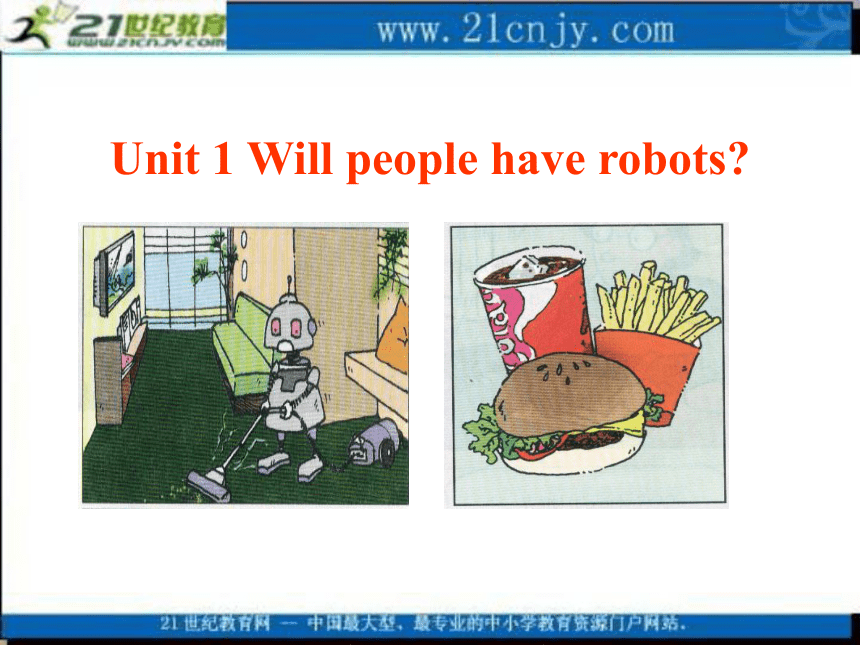 | |
| 格式 | zip | ||
| 文件大小 | 525.3KB | ||
| 资源类型 | 教案 | ||
| 版本资源 | 鲁教版(五四学制) | ||
| 科目 | 英语 | ||
| 更新时间 | 2009-11-02 11:21:00 | ||
图片预览

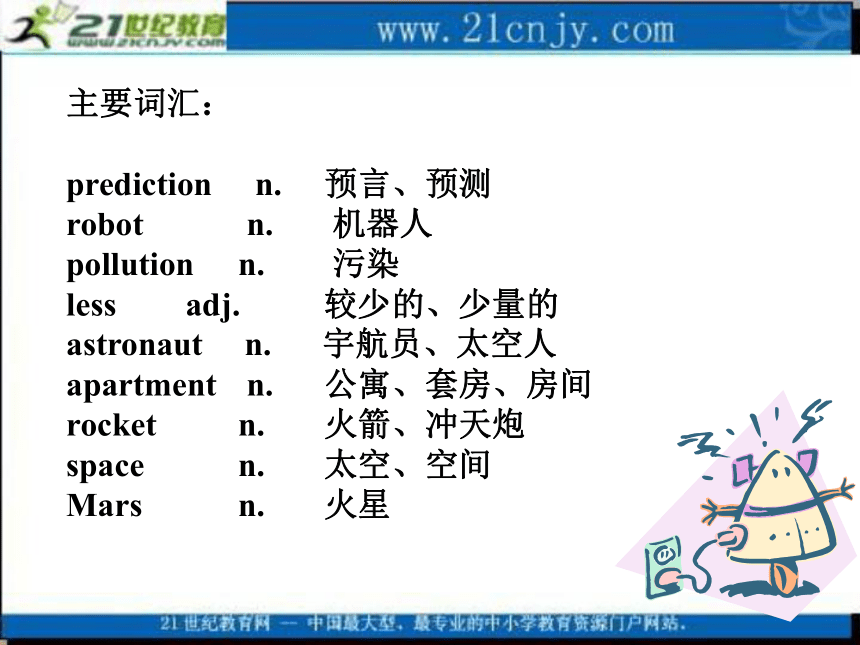
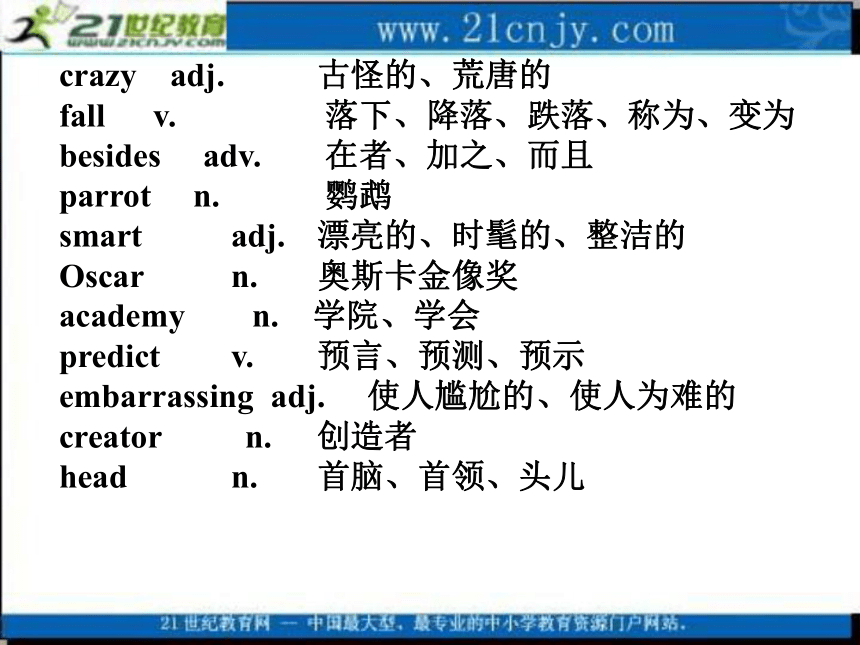
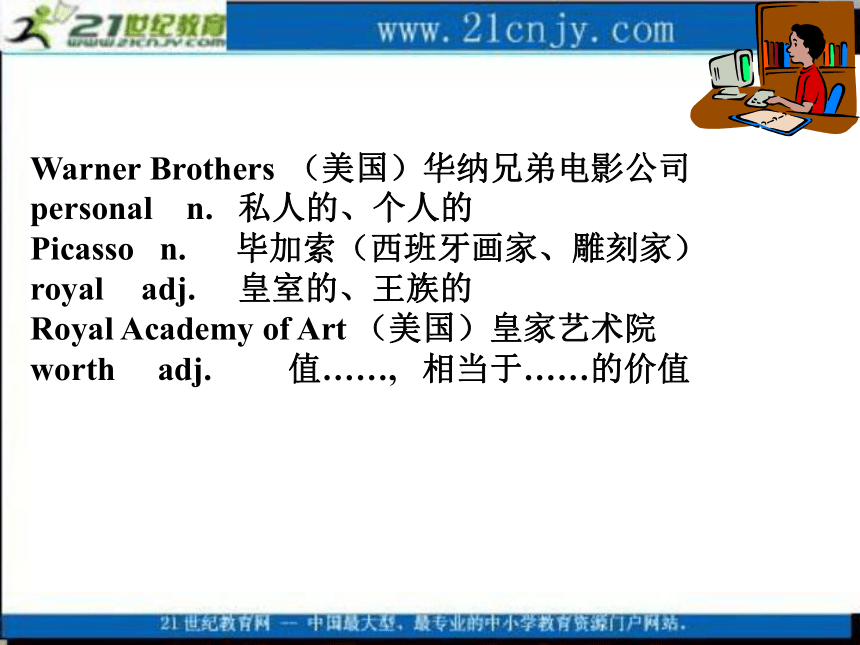
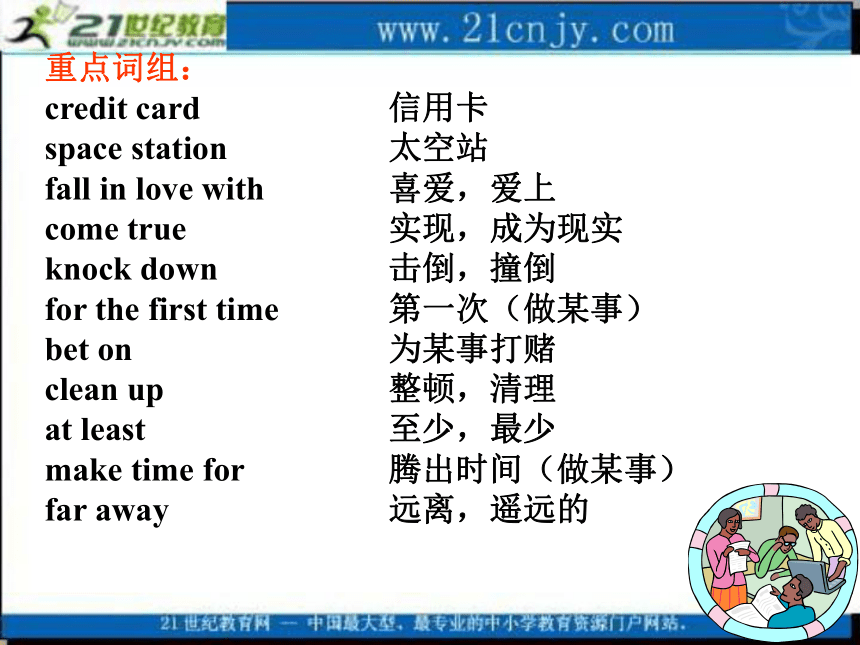
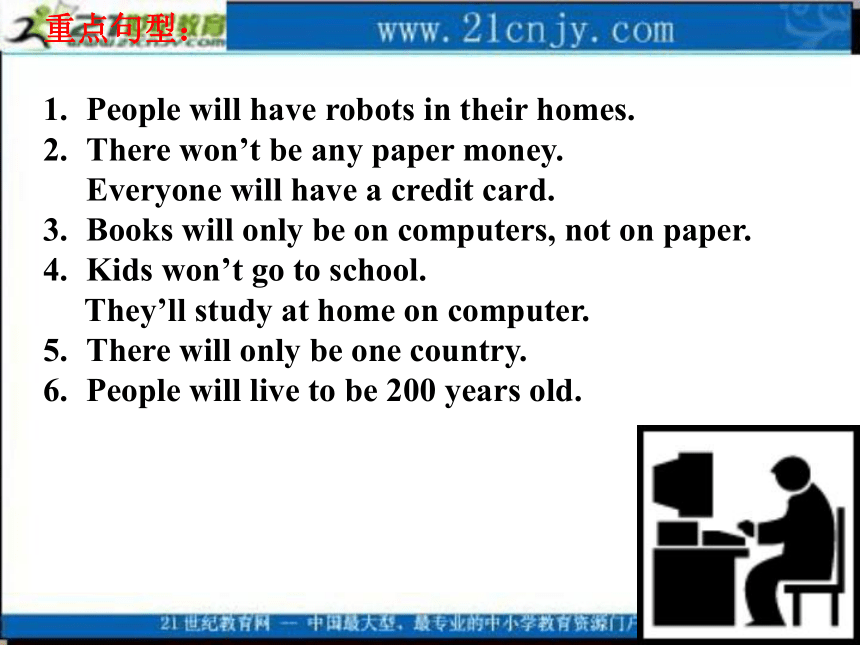
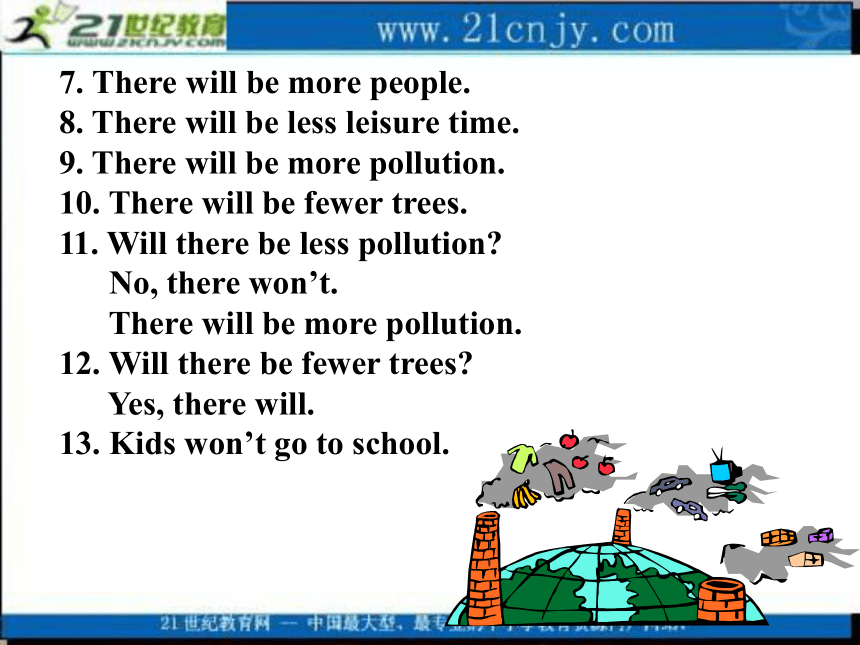
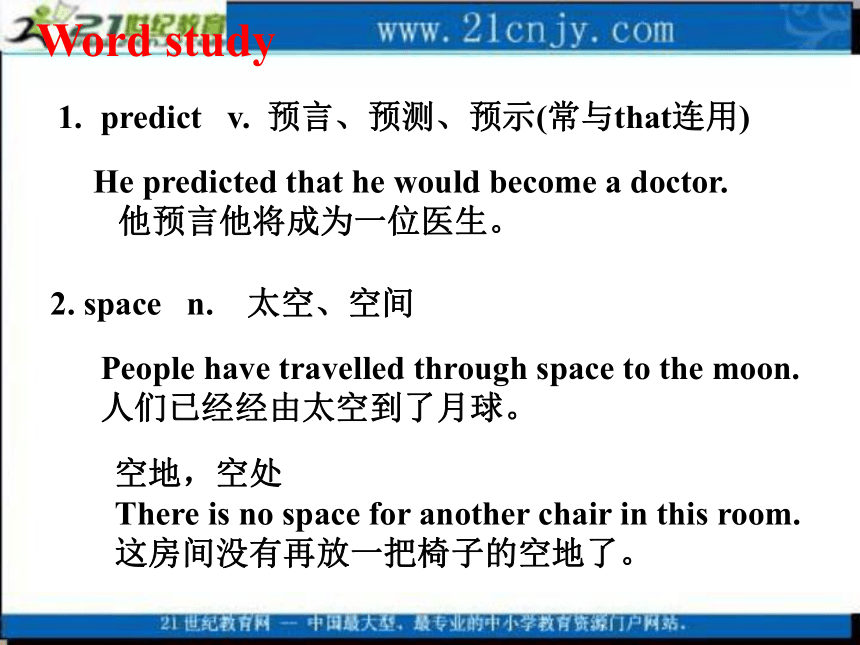
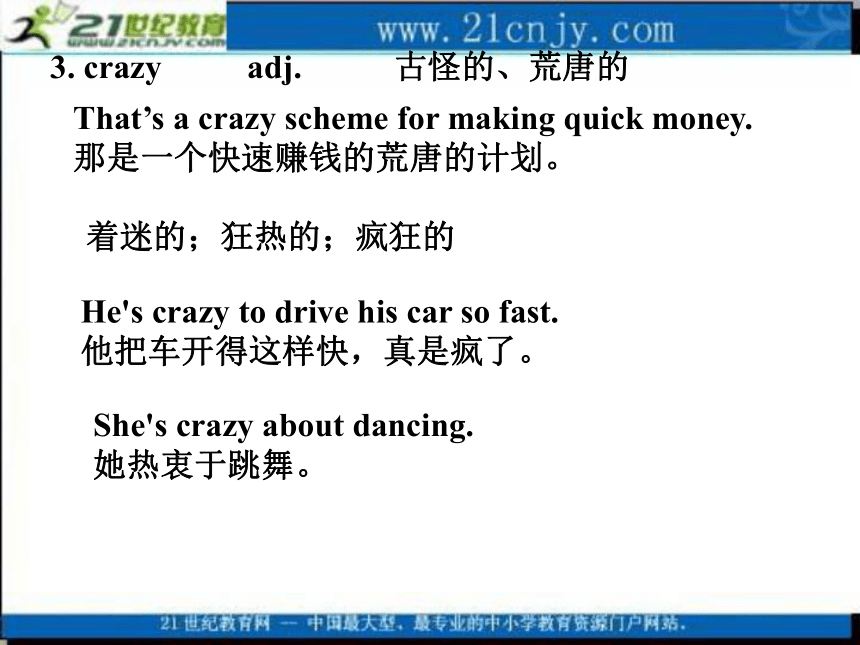
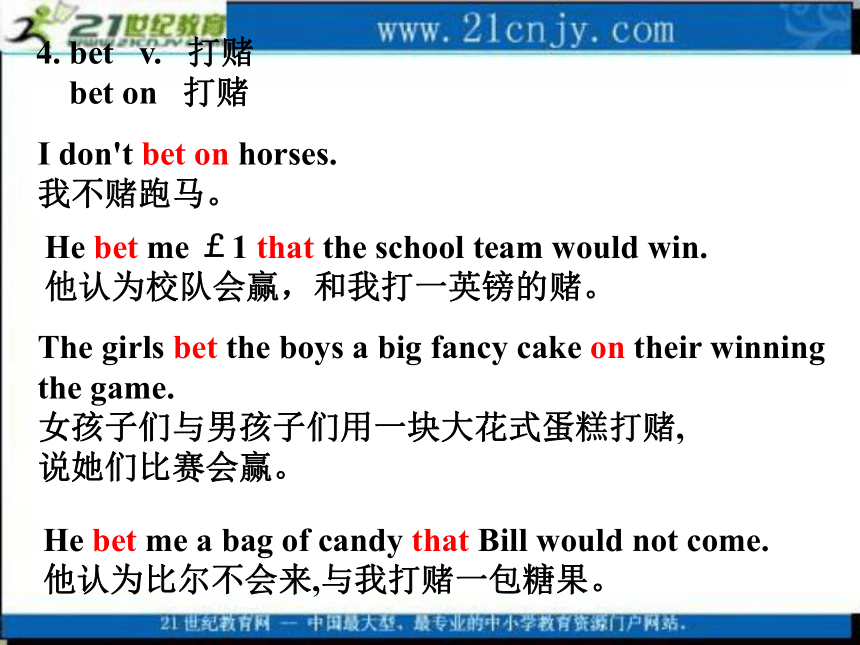
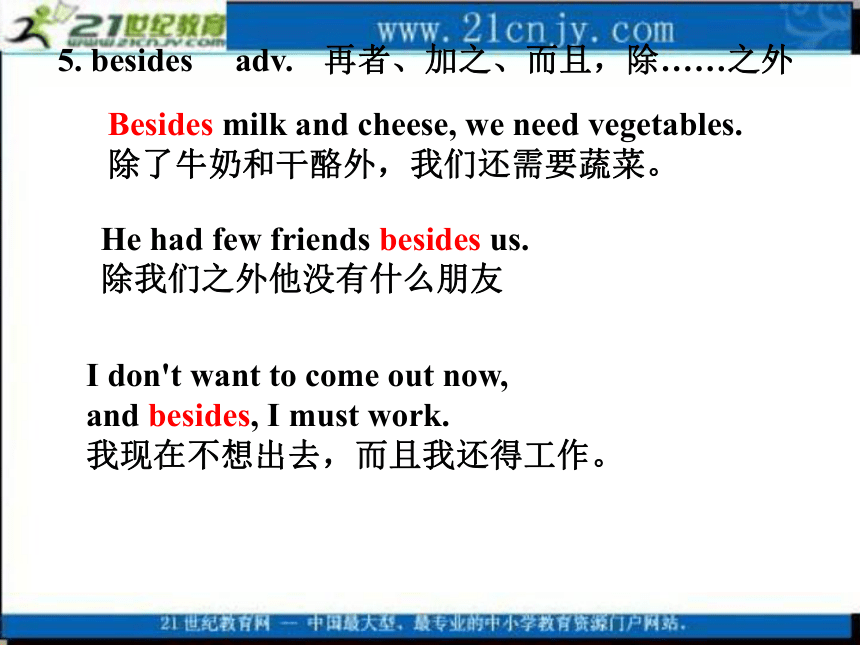
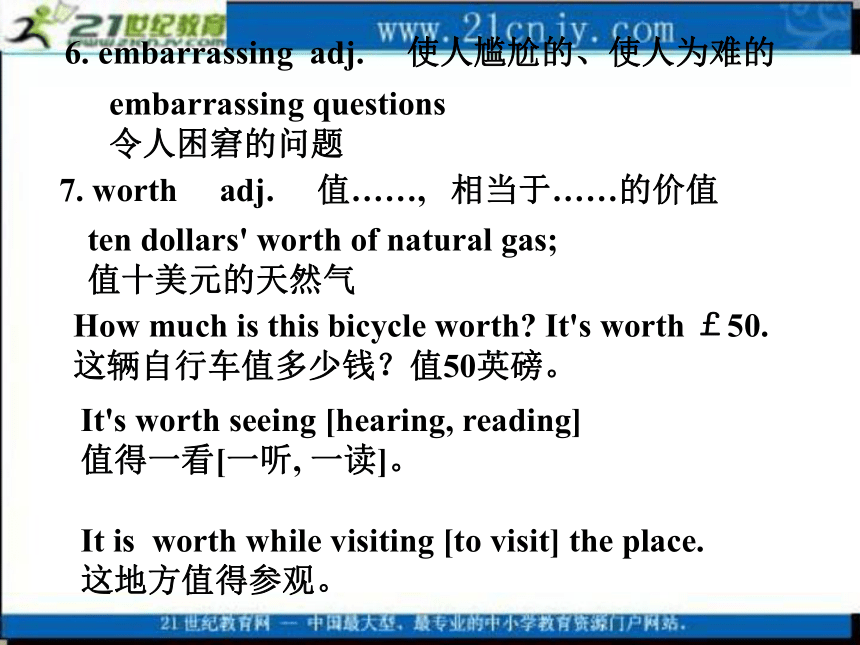
文档简介
课件43张PPT。
Unit 1 Will people have robots?
主要词汇:
prediction n. 预言、预测
robot n. 机器人
pollution n. 污染
less adj. 较少的、少量的
astronaut n. 宇航员、太空人
apartment n. 公寓、套房、房间
rocket n. 火箭、冲天炮
space n. 太空、空间
Mars n. 火星crazy adj. 古怪的、荒唐的
fall v. 落下、降落、跌落、称为、变为
besides adv. 在者、加之、而且
parrot n. 鹦鹉
smart adj. 漂亮的、时髦的、整洁的
Oscar n. 奥斯卡金像奖
academy n. 学院、学会
predict v. 预言、预测、预示
embarrassing adj. 使人尴尬的、使人为难的
creator n. 创造者
head n. 首脑、首领、头儿
Warner Brothers (美国)华纳兄弟电影公司
personal n. 私人的、个人的
Picasso n. 毕加索(西班牙画家、雕刻家)
royal adj. 皇室的、王族的
Royal Academy of Art (美国)皇家艺术院
worth adj. 值……, 相当于……的价值重点词组:
credit card 信用卡
space station 太空站
fall in love with 喜爱,爱上
come true 实现,成为现实
knock down 击倒,撞倒
for the first time 第一次(做某事)
bet on 为某事打赌
clean up 整顿,清理
at least 至少,最少
make time for 腾出时间(做某事)
far away 远离,遥远的
重点句型:
People will have robots in their homes.
There won’t be any paper money.
Everyone will have a credit card.
Books will only be on computers, not on paper.
Kids won’t go to school.
They’ll study at home on computer.
There will only be one country.
People will live to be 200 years old.
7. There will be more people.
8. There will be less leisure time.
9. There will be more pollution.
10. There will be fewer trees.
11. Will there be less pollution?
No, there won’t.
There will be more pollution.
12. Will there be fewer trees?
Yes, there will.
13. Kids won’t go to school.Word studypredict v. 预言、预测、预示(常与that连用) He predicted that he would become a doctor.
他预言他将成为一位医生。2. space n. 太空、空间 People have travelled through space to the moon.
人们已经经由太空到了月球。空地,空处
There is no space for another chair in this room.
这房间没有再放一把椅子的空地了。3. crazy adj. 古怪的、荒唐的 He's crazy to drive his car so fast.
他把车开得这样快,真是疯了。That’s a crazy scheme for making quick money.
那是一个快速赚钱的荒唐的计划。She's crazy about dancing.
她热衷于跳舞。着迷的;狂热的;疯狂的I don't bet on horses.
我不赌跑马。4. bet v. 打赌
bet on 打赌He bet me £1 that the school team would win.
他认为校队会赢,和我打一英镑的赌。The girls bet the boys a big fancy cake on their winning
the game.
女孩子们与男孩子们用一块大花式蛋糕打赌,
说她们比赛会赢。He bet me a bag of candy that Bill would not come.
他认为比尔不会来,与我打赌一包糖果。5. besides adv. 再者、加之、而且,除……之外Besides milk and cheese, we need vegetables.
除了牛奶和干酪外,我们还需要蔬菜。He had few friends besides us.
除我们之外他没有什么朋友I don't want to come out now,
and besides, I must work.
我现在不想出去,而且我还得工作。6. embarrassing adj. 使人尴尬的、使人为难的 embarrassing questions
令人困窘的问题7. worth adj. 值……, 相当于……的价值 ten dollars' worth of natural gas;
值十美元的天然气How much is this bicycle worth? It's worth £50.
这辆自行车值多少钱?值50英磅。It's worth seeing [hearing, reading]
值得一看[一听, 一读]。
It is worth while visiting [to visit] the place.
这地方值得参观。Grammar
little less least
few fewer fewestThere will be fewer trees.
I have fewer CDs than he (has).There will be less pollution.
People have less leisure time than before.
一般将来时一般将来时表示在将来的某个时间要发生的动作或
存在的状态,常与表示将来的时间状语连用。
例如:I(We)shall be back tomorrow.He will come next week. I(We) shall study chemistry next year.They’ll have a math test next Tuesday.We’ll have a meeting tomorrow afternoon.shall 用于第1人称,will 可以用于任一人称。ExerciseThere ________________ another new
school near the lake next year.iswill bewill havewill beI won’t ______ free tomorrow.beamwasbeThe teacher said that she ____________ us to the
park the next day.has takenwill takewould takewould takeMr. Brown asked who ____________ the message
to Evans.will tellis going to tellwould tellwould tell---Will the soup be ready soon?
---Yes, it will. It’ll be ready in a few minutes.介词 in 引导的短语,表示从现在起的某一段时间以后,
通常用于一般将来时。 例如:---Will the train arrive soon?
---Yes, it will. It’ll arrive in five minutes.---Will Dr. Smith be here soon?
---Yes, he will. He’ll be here in half an hour.Would you like some cakes or biscuit?
你要吃点蛋糕还是饼干?Will you have some tea?
你喝点茶,好吗?will 和 would 也可用来表示 “要,希望” Will you please go with me?
请你和我一起去, 好吗?be going to + 动词原形结构,表示现在打算在
最近或将来要做的事,或说话人根据已有的
迹象认为很可能要发生的事情。例如:We ________________ a party tonight.I ________________Mary at the station at ten.They _______________ the Summer Palace
next Monday.are going to haveam going to meetare going to visitExercise如果明天下雪,我们就不去那儿了。We won’t go there if it snows tomorrow. 她打算星期天再帮助 Tim 一次。She is going to help Tim again on Sunday.这个周末有一次会议。There will be/is going to be a meeting this weekend.如果你天天进行体育活动,你就会很健康。You’ll be healthy if you have sports every day.“Betty不久会出院吗? ”
“是的,几天后她就会出院了。”“______ Betty get out of the hospital soon?”
“Yes, she will. She _____ get out of the hospital
_____ ______ _______ _______.”Willwillin a few days“你很快会回来吗?”
“是的,我一周以后回来。”“Will you be back soon?”
“Yes, ______ _______.
I’ll ______ ______ ______ ______ _______.”
I willbe back in a week 某些动词的进行时态表示将要发生的动作。例如:go, come, leave, meet, start, begin, finish… Jack is waiting for a bus. He is going to the park.My father is leaving for Shanghai tomorrow.People are busy shopping. The shops are crowded.
Because the Spring Festival is coming. Reading AI can’t wait for spring to come!∨ Check up___ 1. It’s spring.
___ 2. The girl in the story likes to stay inside
during the spring.
___ 3. The girl has a cold.
___ 4. The trees aren’t green now.
___ 5. The park is near her house.
___ 6. The family has a yard.
___ 7. The family has a TV in their living room. I’m tired of winter. I’m tired of
the snow. I’m tired of cold weather,
and I’m sick and tired of winter coats
and boots! Just think… in a few more
weeks it won’t be winter any more.
It’ll be spring. The weather won’t be cold. It’ll be sunny. I won’t have to stay indoors any more. I’ll go outside and
play with my friends. We’ll ride
bicycles and play
baseball again. In a few more weeks our neighborhood won’t look sad and gray any more. The flowers will bloom, and the trees will become green again.
My family will spend more time outdoors. My father will work in the yard. He’ll cut the grass and paint the fence. My mother will work in the yard too. She’ll buy new flowers and plant them in the garden. On weekends we won’t just sit in the living room and watch TV. We’ll go for walks in the park, and we’ll have picnics on Sunday afternoons.
I can’t wait for spring to come!
Hurry, spring!___ 1. It’s spring.
___ 2. The girl in the story likes to stay inside
during spring.
___ 3. The girl has a cold.
___ 4. The trees aren't green now.
___ 5. The park is near her house.
___ 6. The family has a yard.
___ 7. The family has a TV in their living room.
∨ Check up∨∨∨∨1. ____ a few more weeks it won’t be winter
any more. 2. The flowers____________, and the trees
____________ green again.3. My family __________ more time outdoors. 4. __________ will work in the yard.
He’ll cut the grass and paint the fence.5. ______________ will work ___________too.
She’ll buy new flowers and plant______
in the gardenFill in the blanks I’m tired of winter. I’m tired of
the snow. I’m tired of cold weather,
and I’m sick and tired of winter coats
and boots! Just think… in a few more
weeks it won’t be winter any more.
It’ll be spring. The weather won’t be cold. It’ll be sunny. I won’t have to stay indoors any more. I’ll go outside and
play with my friends. We’ll ride
bicycles and play
baseball again. In a few more weeks our neighborhood won’t look sad and gray any more. The flowers will bloom, and the trees will become green again.
My family will spend more time outdoors. My father will work in the yard. He’ll cut the grass and paint the fence. My mother will work in the yard too. She’ll buy new flowers and plant them in the garden. On weekends we won’t just sit in the living room and watch TV. We’ll go for walks in the park, and we’ll have picnics on Sunday afternoons.
I can’t wait for spring to come!
Hurry, spring!2. The flowers____________, and the trees
____________ green again.1. ____ a few more weeks it won’t be winter
any more. 3. My family __________ more time outdoors. 4. __________ will work in the yard.
He’ll cut the grass and paint the fence. 5. ______________ will work ___________too.
She’ll buy new flowers and plant______
in the gardenInwill bloomwill becomewill spendMy fatherMy motherin the yardthemReading B The beautiful pink soup ( ) 1. According to the passage, which of the following
is true? A. Americans never ate tomatoes after they began to plant.B. Americans didn't eat tomatoes before the 18th century.C. Even now Americans don’t eat tomatoes.D. In the 18th century Americans ate a lot of tomatoes.( ) 2. The passage tells us that Jefferson was
a president of . A. a European countryB. EnglandC. FranceD. the USA( ) 3. Jefferson learned that tomatoes were good to eat .
( ) 4. From the passage we know all the honored
guests invited by Jefferson were .
A.while he was in ParisB.when he was a little boyC.because his parents told him soD.from booksA.people from other countriesB.from FranceC.people of his own countryD.men only( ) 5. According to the passage, which of the following is FALSE? A. All of guests knew the soup which was served
at the President’s party was made of tomatoes.B. All the guests thought the soup which was
prepared by the President’s cook was nice.C. All the guests thought the taste of the beautiful
pink soup was nice.D. All of the guests didn't know that their President
would serve his honored guests poison apples. People have strange ideas about food. For example,
tomato is a kind of very delicious vegetable. It is one
of the useful plants that can be prepared in many
ways. It has rich nutrition and vitamin in it.
But in the 18th century, Americans never ate tomatoes.
They grew them in their gardens because tomato
plants are so pretty. But they thought the vegetable
was poisonous. They called tomatoes “poison apples”.
President Thomas Jefferson, however, knew that
tomatoes were good to eat. He was a learned man.
He had been to Paris, where he learned to love the taste
of tomatoes. He grew many kinds of tomatoes in his
garden. The President taught his cook a way for a cream
of tomato soup. This beautiful pink soup was served
at the President’s party. The guests thought the soup
tasted really good. They never thought their president
would serve his honored guests poison apples.
Jefferson never spoke to his honored guests about
the fact.
注释: nutrition n. 营养
vitamin n. 维生素
poisonous adj. 有毒的( ) 1. According to the passage, which of the following
is true? A. Americans never ate tomatoes after they began to plant.B. Americans didn't eat tomatoes before the 18th century.C. Even now Americans don’t eat tomatoes.D. In the 18th century Americans ate a lot of tomatoes.( ) 2. The passage tells us that Jefferson was
a president of . A. a European countryB. EnglandC. FranceD. the USABD( ) 3. Jefferson learned that tomatoes were good to eat .
( ) 4. From the passage we know all the honored
guests invited by Jefferson were .
A.while he was in ParisB.when he was a little boyC.because his parents told him soD.from booksA.people from other countriesB.from FranceC.people of his own countryD.men onlyAC( ) 5. According to the passage, which of the following is FALSE? A. All of guests knew the soup which was served
at the President’s party was made of tomatoes.B. All the guests thought the soup which was
prepared by the President’s cook was nice.C. All the guests thought the taste of the beautiful
pink soup was nice.D. All of the guests didn't know that their President
would serve his honored guests poison apples.AComplete the sentences1. 我最喜爱的食物是甜玉米。______ ________ food is sweet corn. My favorite2. 那道汤吃起来有点儿咸,但是味道很好。The soup tasted _____ ______ salty,
but it ______ very good.a littlesmelt3. 西红柿里含有丰富的营养和维生素。Tomato has _____ nutrition and vitamin ____it. richin4. 蛋糕上的奶油看上去有点儿奇怪。The ______ on the cakes_______ _________ . creamseemed strange5. 怪不得今天早晨我的肚子感觉不舒服。 _____ _______ my stomach _____ _______this morning.No wonderfelt terrible6. 在日本,人们喜欢吃生鱼。In Japan, people like ____ ____ __________ fish.to eatuncooked7. 在美国,人们吃许多的汉堡包。In America, people eat hamburgers___ ___. a lot Bye!Thank you for listening!
prediction n. 预言、预测
robot n. 机器人
pollution n. 污染
less adj. 较少的、少量的
astronaut n. 宇航员、太空人
apartment n. 公寓、套房、房间
rocket n. 火箭、冲天炮
space n. 太空、空间
Mars n. 火星crazy adj. 古怪的、荒唐的
fall v. 落下、降落、跌落、称为、变为
besides adv. 在者、加之、而且
parrot n. 鹦鹉
smart adj. 漂亮的、时髦的、整洁的
Oscar n. 奥斯卡金像奖
academy n. 学院、学会
predict v. 预言、预测、预示
embarrassing adj. 使人尴尬的、使人为难的
creator n. 创造者
head n. 首脑、首领、头儿
Warner Brothers (美国)华纳兄弟电影公司
personal n. 私人的、个人的
Picasso n. 毕加索(西班牙画家、雕刻家)
royal adj. 皇室的、王族的
Royal Academy of Art (美国)皇家艺术院
worth adj. 值……, 相当于……的价值重点词组:
credit card 信用卡
space station 太空站
fall in love with 喜爱,爱上
come true 实现,成为现实
knock down 击倒,撞倒
for the first time 第一次(做某事)
bet on 为某事打赌
clean up 整顿,清理
at least 至少,最少
make time for 腾出时间(做某事)
far away 远离,遥远的
重点句型:
People will have robots in their homes.
There won’t be any paper money.
Everyone will have a credit card.
Books will only be on computers, not on paper.
Kids won’t go to school.
They’ll study at home on computer.
There will only be one country.
People will live to be 200 years old.
7. There will be more people.
8. There will be less leisure time.
9. There will be more pollution.
10. There will be fewer trees.
11. Will there be less pollution?
No, there won’t.
There will be more pollution.
12. Will there be fewer trees?
Yes, there will.
13. Kids won’t go to school.Word studypredict v. 预言、预测、预示(常与that连用) He predicted that he would become a doctor.
他预言他将成为一位医生。2. space n. 太空、空间 People have travelled through space to the moon.
人们已经经由太空到了月球。空地,空处
There is no space for another chair in this room.
这房间没有再放一把椅子的空地了。3. crazy adj. 古怪的、荒唐的 He's crazy to drive his car so fast.
他把车开得这样快,真是疯了。That’s a crazy scheme for making quick money.
那是一个快速赚钱的荒唐的计划。She's crazy about dancing.
她热衷于跳舞。着迷的;狂热的;疯狂的I don't bet on horses.
我不赌跑马。4. bet v. 打赌
bet on 打赌He bet me £1 that the school team would win.
他认为校队会赢,和我打一英镑的赌。The girls bet the boys a big fancy cake on their winning
the game.
女孩子们与男孩子们用一块大花式蛋糕打赌,
说她们比赛会赢。He bet me a bag of candy that Bill would not come.
他认为比尔不会来,与我打赌一包糖果。5. besides adv. 再者、加之、而且,除……之外Besides milk and cheese, we need vegetables.
除了牛奶和干酪外,我们还需要蔬菜。He had few friends besides us.
除我们之外他没有什么朋友I don't want to come out now,
and besides, I must work.
我现在不想出去,而且我还得工作。6. embarrassing adj. 使人尴尬的、使人为难的 embarrassing questions
令人困窘的问题7. worth adj. 值……, 相当于……的价值 ten dollars' worth of natural gas;
值十美元的天然气How much is this bicycle worth? It's worth £50.
这辆自行车值多少钱?值50英磅。It's worth seeing [hearing, reading]
值得一看[一听, 一读]。
It is worth while visiting [to visit] the place.
这地方值得参观。Grammar
little less least
few fewer fewestThere will be fewer trees.
I have fewer CDs than he (has).There will be less pollution.
People have less leisure time than before.
一般将来时一般将来时表示在将来的某个时间要发生的动作或
存在的状态,常与表示将来的时间状语连用。
例如:I(We)shall be back tomorrow.He will come next week. I(We) shall study chemistry next year.They’ll have a math test next Tuesday.We’ll have a meeting tomorrow afternoon.shall 用于第1人称,will 可以用于任一人称。ExerciseThere ________________ another new
school near the lake next year.iswill bewill havewill beI won’t ______ free tomorrow.beamwasbeThe teacher said that she ____________ us to the
park the next day.has takenwill takewould takewould takeMr. Brown asked who ____________ the message
to Evans.will tellis going to tellwould tellwould tell---Will the soup be ready soon?
---Yes, it will. It’ll be ready in a few minutes.介词 in 引导的短语,表示从现在起的某一段时间以后,
通常用于一般将来时。 例如:---Will the train arrive soon?
---Yes, it will. It’ll arrive in five minutes.---Will Dr. Smith be here soon?
---Yes, he will. He’ll be here in half an hour.Would you like some cakes or biscuit?
你要吃点蛋糕还是饼干?Will you have some tea?
你喝点茶,好吗?will 和 would 也可用来表示 “要,希望” Will you please go with me?
请你和我一起去, 好吗?be going to + 动词原形结构,表示现在打算在
最近或将来要做的事,或说话人根据已有的
迹象认为很可能要发生的事情。例如:We ________________ a party tonight.I ________________Mary at the station at ten.They _______________ the Summer Palace
next Monday.are going to haveam going to meetare going to visitExercise如果明天下雪,我们就不去那儿了。We won’t go there if it snows tomorrow. 她打算星期天再帮助 Tim 一次。She is going to help Tim again on Sunday.这个周末有一次会议。There will be/is going to be a meeting this weekend.如果你天天进行体育活动,你就会很健康。You’ll be healthy if you have sports every day.“Betty不久会出院吗? ”
“是的,几天后她就会出院了。”“______ Betty get out of the hospital soon?”
“Yes, she will. She _____ get out of the hospital
_____ ______ _______ _______.”Willwillin a few days“你很快会回来吗?”
“是的,我一周以后回来。”“Will you be back soon?”
“Yes, ______ _______.
I’ll ______ ______ ______ ______ _______.”
I willbe back in a week 某些动词的进行时态表示将要发生的动作。例如:go, come, leave, meet, start, begin, finish… Jack is waiting for a bus. He is going to the park.My father is leaving for Shanghai tomorrow.People are busy shopping. The shops are crowded.
Because the Spring Festival is coming. Reading AI can’t wait for spring to come!∨ Check up___ 1. It’s spring.
___ 2. The girl in the story likes to stay inside
during the spring.
___ 3. The girl has a cold.
___ 4. The trees aren’t green now.
___ 5. The park is near her house.
___ 6. The family has a yard.
___ 7. The family has a TV in their living room. I’m tired of winter. I’m tired of
the snow. I’m tired of cold weather,
and I’m sick and tired of winter coats
and boots! Just think… in a few more
weeks it won’t be winter any more.
It’ll be spring. The weather won’t be cold. It’ll be sunny. I won’t have to stay indoors any more. I’ll go outside and
play with my friends. We’ll ride
bicycles and play
baseball again. In a few more weeks our neighborhood won’t look sad and gray any more. The flowers will bloom, and the trees will become green again.
My family will spend more time outdoors. My father will work in the yard. He’ll cut the grass and paint the fence. My mother will work in the yard too. She’ll buy new flowers and plant them in the garden. On weekends we won’t just sit in the living room and watch TV. We’ll go for walks in the park, and we’ll have picnics on Sunday afternoons.
I can’t wait for spring to come!
Hurry, spring!___ 1. It’s spring.
___ 2. The girl in the story likes to stay inside
during spring.
___ 3. The girl has a cold.
___ 4. The trees aren't green now.
___ 5. The park is near her house.
___ 6. The family has a yard.
___ 7. The family has a TV in their living room.
∨ Check up∨∨∨∨1. ____ a few more weeks it won’t be winter
any more. 2. The flowers____________, and the trees
____________ green again.3. My family __________ more time outdoors. 4. __________ will work in the yard.
He’ll cut the grass and paint the fence.5. ______________ will work ___________too.
She’ll buy new flowers and plant______
in the gardenFill in the blanks I’m tired of winter. I’m tired of
the snow. I’m tired of cold weather,
and I’m sick and tired of winter coats
and boots! Just think… in a few more
weeks it won’t be winter any more.
It’ll be spring. The weather won’t be cold. It’ll be sunny. I won’t have to stay indoors any more. I’ll go outside and
play with my friends. We’ll ride
bicycles and play
baseball again. In a few more weeks our neighborhood won’t look sad and gray any more. The flowers will bloom, and the trees will become green again.
My family will spend more time outdoors. My father will work in the yard. He’ll cut the grass and paint the fence. My mother will work in the yard too. She’ll buy new flowers and plant them in the garden. On weekends we won’t just sit in the living room and watch TV. We’ll go for walks in the park, and we’ll have picnics on Sunday afternoons.
I can’t wait for spring to come!
Hurry, spring!2. The flowers____________, and the trees
____________ green again.1. ____ a few more weeks it won’t be winter
any more. 3. My family __________ more time outdoors. 4. __________ will work in the yard.
He’ll cut the grass and paint the fence. 5. ______________ will work ___________too.
She’ll buy new flowers and plant______
in the gardenInwill bloomwill becomewill spendMy fatherMy motherin the yardthemReading B The beautiful pink soup ( ) 1. According to the passage, which of the following
is true? A. Americans never ate tomatoes after they began to plant.B. Americans didn't eat tomatoes before the 18th century.C. Even now Americans don’t eat tomatoes.D. In the 18th century Americans ate a lot of tomatoes.( ) 2. The passage tells us that Jefferson was
a president of . A. a European countryB. EnglandC. FranceD. the USA( ) 3. Jefferson learned that tomatoes were good to eat .
( ) 4. From the passage we know all the honored
guests invited by Jefferson were .
A.while he was in ParisB.when he was a little boyC.because his parents told him soD.from booksA.people from other countriesB.from FranceC.people of his own countryD.men only( ) 5. According to the passage, which of the following is FALSE? A. All of guests knew the soup which was served
at the President’s party was made of tomatoes.B. All the guests thought the soup which was
prepared by the President’s cook was nice.C. All the guests thought the taste of the beautiful
pink soup was nice.D. All of the guests didn't know that their President
would serve his honored guests poison apples. People have strange ideas about food. For example,
tomato is a kind of very delicious vegetable. It is one
of the useful plants that can be prepared in many
ways. It has rich nutrition and vitamin in it.
But in the 18th century, Americans never ate tomatoes.
They grew them in their gardens because tomato
plants are so pretty. But they thought the vegetable
was poisonous. They called tomatoes “poison apples”.
President Thomas Jefferson, however, knew that
tomatoes were good to eat. He was a learned man.
He had been to Paris, where he learned to love the taste
of tomatoes. He grew many kinds of tomatoes in his
garden. The President taught his cook a way for a cream
of tomato soup. This beautiful pink soup was served
at the President’s party. The guests thought the soup
tasted really good. They never thought their president
would serve his honored guests poison apples.
Jefferson never spoke to his honored guests about
the fact.
注释: nutrition n. 营养
vitamin n. 维生素
poisonous adj. 有毒的( ) 1. According to the passage, which of the following
is true? A. Americans never ate tomatoes after they began to plant.B. Americans didn't eat tomatoes before the 18th century.C. Even now Americans don’t eat tomatoes.D. In the 18th century Americans ate a lot of tomatoes.( ) 2. The passage tells us that Jefferson was
a president of . A. a European countryB. EnglandC. FranceD. the USABD( ) 3. Jefferson learned that tomatoes were good to eat .
( ) 4. From the passage we know all the honored
guests invited by Jefferson were .
A.while he was in ParisB.when he was a little boyC.because his parents told him soD.from booksA.people from other countriesB.from FranceC.people of his own countryD.men onlyAC( ) 5. According to the passage, which of the following is FALSE? A. All of guests knew the soup which was served
at the President’s party was made of tomatoes.B. All the guests thought the soup which was
prepared by the President’s cook was nice.C. All the guests thought the taste of the beautiful
pink soup was nice.D. All of the guests didn't know that their President
would serve his honored guests poison apples.AComplete the sentences1. 我最喜爱的食物是甜玉米。______ ________ food is sweet corn. My favorite2. 那道汤吃起来有点儿咸,但是味道很好。The soup tasted _____ ______ salty,
but it ______ very good.a littlesmelt3. 西红柿里含有丰富的营养和维生素。Tomato has _____ nutrition and vitamin ____it. richin4. 蛋糕上的奶油看上去有点儿奇怪。The ______ on the cakes_______ _________ . creamseemed strange5. 怪不得今天早晨我的肚子感觉不舒服。 _____ _______ my stomach _____ _______this morning.No wonderfelt terrible6. 在日本,人们喜欢吃生鱼。In Japan, people like ____ ____ __________ fish.to eatuncooked7. 在美国,人们吃许多的汉堡包。In America, people eat hamburgers___ ___. a lot Bye!Thank you for listening!
同课章节目录
- Unit 1 Could you please clean your room?
- Section A
- Section B
- Unit 2 Why don't you talk to your parents?
- Section A
- Section B
- Unit 3 What were you doing when the rainstorm came
- Section A
- Section B
- Unit 4 An old man tried to move the mountains.
- Section A
- Section B
- Unit 5 What's the highest mountain in the world?
- Section A
- Section B
- Unit 6 Have you read Treasure Island yet?
- Section A
- Section B
- Unit 7 Have you ever been to a museum?
- Section A
- Section B
- Unit 8 I've had this bike for three years.
- Section A
- Section B
